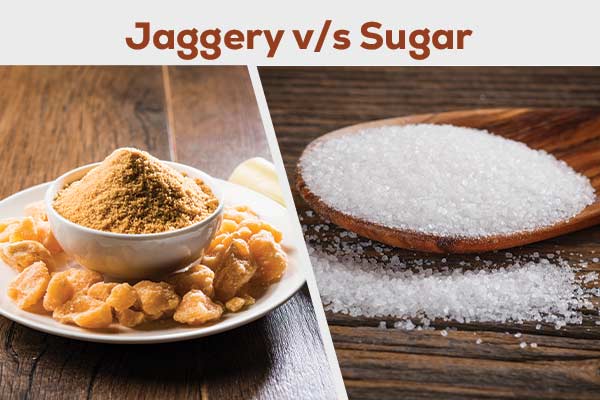Jaggery vs sugar both ubiquitous sweeteners, have been integral parts of human diets for centuries. While they serve the same purpose of sweetening foods and beverages, they differ significantly in their nutritional content, health benefits, and culinary applications. In this article, we’ll delve into the distinctions between jaggery and sugar, exploring their nutritional value, health effects, environmental impact, culinary uses, and cultural significance.
Nutritional Composition
Jaggery
Jaggery, a traditional sweetener in many parts of the world, is made by boiling sugarcane juice or palm sap until it solidifies. It retains more of the natural nutrients present in the sugarcane, including vitamins and minerals like iron, magnesium, and potassium. Additionally, jaggery contains antioxidants and is often considered a healthier alternative to refined sugar.
Sugar
On the other hand, sugar, particularly white sugar, undergoes extensive processing, resulting in the removal of most nutrients. It primarily consists of sucrose, offering empty calories devoid of essential vitamins and minerals. However, certain varieties like brown sugar and raw sugar may retain some nutrients due to less processing.
Health Benefits of Jaggery
Rich in Antioxidants
Jaggery contains antioxidants like selenium and zinc, which help neutralize harmful free radicals in the body, reducing oxidative stress and lowering the risk of chronic diseases.
Good for Digestion
Due to its alkaline nature, jaggery aids in digestion by stimulating the production of digestive enzymes and facilitating bowel movements. It is often consumed after meals to aid digestion.
Boosts Immunity
The vitamins and minerals present in jaggery, especially iron, contribute to a healthy immune system, helping the body fight infections and illnesses more effectively.
Health Risks of Jaggery
High Calorie Content
While jaggery offers nutritional benefits, it is calorie-dense and should be consumed in moderation, especially by individuals watching their calorie intake or trying to manage their weight.
Potential for Blood Sugar Spike
Although jaggery is often promoted as a healthier alternative to sugar for individuals with diabetes, it can still cause spikes in blood sugar levels due to its high glycemic index. Therefore, people with diabetes should consume it cautiously.
Health Benefits of Sugar
Quick Source of Energy
Sugar provides a quick energy boost due to its high carbohydrate content, making it an ideal choice for athletes and individuals needing an immediate energy source.
Versatility in Culinary Use
Sugar’s neutral flavor and ability to caramelize make it a versatile ingredient in various culinary applications, including baking, confectionery, and beverage production.
Health Risks of Sugar
Empty Calories
Refined sugar offers little to no nutritional value besides providing calories, contributing to weight gain, and increasing the risk of obesity-related health conditions.
Associated with Chronic Diseases
Excessive sugar consumption has been linked to an increased risk of chronic diseases like obesity, type 2 diabetes, heart disease, and dental issues, making it essential to limit intake.
Environmental Impact
Jaggery Production
Jaggery production typically involves simple processing methods that have minimal environmental impact, relying on natural resources like sugarcane or palm trees.
Sugar Production
In contrast, sugar production, especially from sugarcane, can be resource-intensive and environmentally damaging, with concerns about deforestation, water usage, and chemical pollution.
Culinary Uses
Jaggery in Traditional Cuisine
Jaggery finds widespread use in traditional cuisines worldwide, adding sweetness and depth of flavor to dishes like desserts, sweets, snacks, and beverages.
Sugar in Modern Cooking
Sugar is a staple ingredient in modern cooking and baking, used in a wide range of products, including pastries, cakes, cookies, sauces, dressings, and preserved foods.
Price Comparison
Jaggery’s price may vary depending on factors like production method, quality, and regional availability, but it is generally more expensive than refined sugar due to its artisanal production process and perceived health benefits.
Availability and Accessibility
While jaggery may be readily available in regions where sugarcane or palm trees are cultivated, sugar is more widely accessible and affordable globally due to mass production and distribution networks.
Cultural Significance
Both jaggery and sugar hold cultural significance in various cuisines and traditions, often symbolizing sweetness, hospitality, and celebration in rituals, festivals, and everyday life.
Conclusion
In conclusion, jaggery and sugar offer distinct characteristics and nutritional profiles, catering to different preferences and dietary requirements. While jaggery provides natural sweetness and potential health benefits due to its nutrient content, sugar remains a versatile and affordable sweetener widely used in modern cooking. When choosing between the two, individuals should consider factors like nutritional needs, taste preferences, and environmental impact to make informed decisions about their sweetener consumption.


